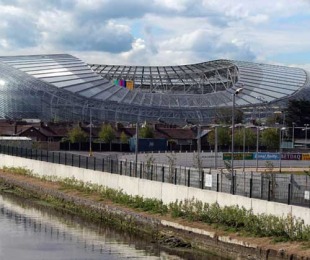|
Irish Rugby
IRFU chief fears French raid
ESPNscrum Staff
October 22, 2010

The construction of the Aviva Stadium has left the IRFU with huge debts
© Getty Images
Enlarge
Irish rugby chief Philip Browne has warned that the IRFU will be powerless if big French clubs come looking for top players after the World Cup. Ronan O'Gara is among the stars of the Irish game being linked with a big money move to the Top 14 when his contract expires after next year's tournament in New Zealand and Browne said the union simply cannot compete with the big spending French sides' budgets. The Irish union is feeling the effects of the country's deep recession, with clubs struggling to sell €100 tickets for the November internationals in the new Aviva Stadium, the construction of which has left them with debts of €38 million. The IRFU's surplus last year fell by 16 per cent to €1.6 million and Browne expects it to record a "small cash deficit" for the current financial year, which ends on April 30. And while the domestic club game is feeling the pinch, the provinces are demanding more power to compete with the financially powerful English and French club games. But Browne defended the centralised system that sees Irish players contracted to the IRFU above their contracts, saying the national team's needs are the most important. "Our top players are on competitive salaries," he told the Irish Times. "They're not Dan Carter salaries out of Toulon, getting a million a year. We simply couldn't afford that. There's an €8 million budget in Munster against a budget in excess of €20 million in Toulouse and €19 million in Toulon. That's what we're up against. "We're working off a shoestring at the end of the day. If we start reducing ticket prices to the extent that it actually impacts the professional game, we won't have competitive teams. If we don't have competitive teams, we'll find that we won't get the support we're getting at national and provincial level. "We couldn't allow them (the provinces) to secure their financing on the stadiums. That would be selling your birthright. The only other thing they could control are the players. We're not going to cede control of the players. Without the players, we'd have difficulty fielding a national team of any quality because they'd be played into the ground by independent owners." With the stadium swallowing a substantial chunk of their €59.1 million income last year, Browne has targeted getting the union out of "continuous debt cycle" in the next number of years which again calls into question the future of Connacht whose players and staff have been operating on one year contracts this season. "We have a tranche of [1,300 premium] 10-year tickets coming through in 2013/14," he said. "If we can sell those, and that's a big 'If' in the current market, that would allow us to effectively take the bank debt out of the equation. You'd have to ask if you can afford putting €10-€11 million into the domestic game and can you afford four professional teams." Another challenge facing the IRFU is the fielding of a competitive Sevens team for the 2016 OIympic Games in Rio de Janero. Ireland has been slow to embrace the truncated game and does not field a team on the professional circuit. This is down to costs, and Browne is waiting for Irish Sports Council funding to take the next step, although he has reservations over the "I don't see any money of any significance coming from either the International Olympic Council or the Olympic Council of Ireland or indeed the Sports Council," Browne said. "So that begs the question: what gives? And we haven't made a decision as to how we're going to deal with it. In the new year we'll have a better view of how we're going to deal with it. "Sevens rugby clashes directly with the 15-a-side game and you would have to extract 15 to 20 players out of the 15-a-side game. They would undergo a separate training regime. There are some elements that are similar to 15-a-side rugby; obviously they would have to be prepared in a completely different fashion. "So it begs the question: do we have 15-20 players we can take out of the system without leaving a hole in our provinces? For the bigger countries, with bigger playing populations it's an easier proposition. But all of the small unions would be questioning can they afford it. "For us, we don't have a tradition here. That's not to say we can't play sevens rugby. We've got some great players who could easily transfer to the sevens game. But that's the issue - they would have to transfer to the sevens game. There are no easy answers. And the bottom line is that it's going to cost a significant amount of money that we don't have." © ESPN Sports Media Ltd.
|
Live Sports
Communication error please reload the page.
-
Football
-
Cricket
-
Rugby
-
- Days
- Hrs
- Mins
- Secs
F1 - Abu Dhabi GP
Abu Dhabi Grand Prix December 11-131. Max Verstappen ()
2. Valtteri Bottas (Mercedes)
3. Lewis Hamilton (Mercedes)
4. Alexander Albon ()
5. Lando Norris ()
6. Carlos Sainz Jr ()
-
ESPNOtherLive >>
Golf - Houston Open
Snooker - China Open
Tennis - Miami Open

